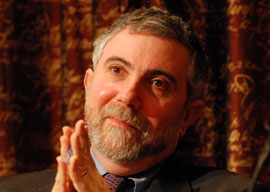
October 11, 2013

Paul Krugman
Paul Krugman is no stranger to demagoguery. The New York Times columnist practically oozes with hatred for his conservative opponents. In spite of his academic accolades”a Nobel Prize in economics and a teaching position at Princeton”the chronically perplexed-looking professor specializes in straw man arguments. It’s not too surprising considering the Grey Lady appeals only to high-minded liberals who already have their minds made up. No loyal Times reader goes to the editorial page looking for a contrary opinion.
In addition to his regular columns, Krugman keeps a blog for which he saves his innermost rancor. In a recent post decrying Republican opposition to Obama’s big-spending agenda, he summed up the motivating force as getting “rid of the Islamic atheist Kenyan socialist, and install someone who will be nice to rich people.” You see, those who oppose Obama’s overtly corporatist policies are only enamored over his godless worship of Allah. There is no legit objection”just racial and religious antipathy for the black man in the White House.
It’s all familiar territory for the world-renowned economist who can’t help but imply his adversaries are Ku Klux Klan members. Like other progressive “thinkers,” Kruggy is quick to call the other side “a haven for racists and reactionaries” when rational debate doesn’t suffice. Since his overt Keynesian theories are too easy to take down on their face, allow me, amiable reader, to sink to the level of offensive ad hominem and dissect the man. It won’t be pretty or eloquent. But if Krugman wants to play in the mud, I will jump right in.
While many children grew up with fantasy novels and mystery tales, a young Paul was far more intrigued by controlling the universe. In his flattering foreword to Isaac Asimov’s Foundation trilogy, Krugman reveals the source of his dictatorship fantasies. He writes:
I didn’t grow up wanting to be a square-jawed individualist or join a heroic quest; I grew up wanting to be Hari Seldon, using my understanding of the mathematics of human behavior to save civilization.
Translation: I spent my childhood wishing that one day I could use large computer models to govern humanity. “Saving civilization” is always a euphemism for stomping on its neck. Krugman became an economist so he could advise political prima donnas on how to best shove around the serfs. Whatever childhood trauma spawned his hatred of the underlings might someday be revealed in an overpriced memoir.
The sad part about Krugman’s unapologetic statist hackery is that his work was once respectable. Prior to his biweekly vomiting of race-baiting and sycophancy in the newspaper of record, he once had a reasoned approach to the dismal science. His book Pop Internationalism contained a witty and incisive defense of free trade. Most surprisingly, the vast majority of the criticism was aimed at a Democratic administration. For a man who now spends his days petting the jackass, it was nice to see some objectivity.
So what ushered in Krugman’s fall to repugnant hyper-partisanship? According to him the 2000 election was “deeply” radicalizing. In other words, the bumbling Texas governor who became chief executive thanks to his Poppy’s connections was too much for Krugman’s precious psyche. All the talk of cutting taxes so the productive class can keep more of its earnings must have lit a fire under his bottom. The next eight years brought us ample columns decrying W. Bush’s incompetence and heartless capitalism. The 2001 Enron accounting scandal was also a driving force behind Krugman’s rampant wealth-bashing, despite his receiving $50,000 from consulting for the company in 1999. Think he acknowledges that personal blemish while trashing greedy account executives? Think again! Rule #1 of political hackery is never let facts get in the way of proselytizing.